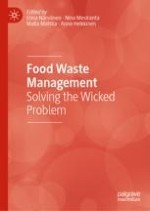2020 | OriginalPaper | Chapter
3. Nudging in Food Waste Management: Where Sustainability Meets Cost-Effectiveness
Authors : Anna de Visser-Amundson, Mirella Kleijnen
Published in: Food Waste Management
Publisher: Springer International Publishing
Activate our intelligent search to find suitable subject content or patents.
Select sections of text to find matching patents with Artificial Intelligence. powered by
Select sections of text to find additional relevant content using AI-assisted search. powered by
